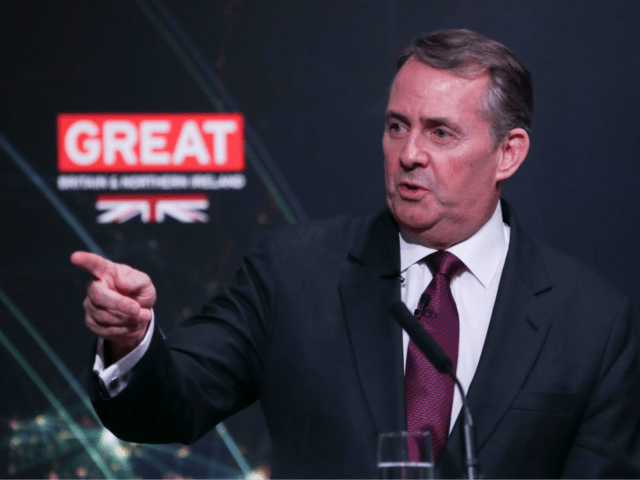LONDON (AP) — One of the British government’s biggest Brexit cheerleaders has slammed warnings of an “economic black hole” when the country leaves the European Union and equated talk of punishing the country to “the language of a gang.”
International Trade Secretary Liam Fox told business leaders Thursday that Brexit can work if the upcoming trade discussions are focused on economic matters rather than politics.
“The idea of punishing Britain is not the language of a club, it’s the language of a gang,” he said at the annual conference of the British Chambers of Commerce. “It’s in all our interests to keep the temperature down.”
Chuka Umunna, a prominent lawmaker in the opposition Labour Party who is advocating Britain remain in the EU’s tariff-free single market and customs union, said Fox’s remarks were nothing more than “playground speak.” He said that leaving the EU, Britain’s biggest trading partner, was “utter madness.”
Though Britain is due to leave the EU in March next year, there are uncertainties over the country’s future relationship with the EU and that’s raised fears of the reintroduction of tariffs on goods. Discussions over the relationship are set to intensify over the coming months and should conclude by the fall in order to give EU parliaments time to vote on any deal.
Prime Minister Theresa May’s proposals for the post-Brexit relationship include the will for Britain to stick closely to EU laws and regulations in certain sectors but to be able to diverge in others.
That ambition has been dismissed by many in the EU as “cherry-picking.”
Though conceding that tariffs would hurt businesses and consumers, Fox sought to paint a rosy picture of the post-Brexit era, not least because trade with the EU has diminished over the past decade.
“There are great prizes for our economy as we leave the EU in this era of globalization if we have the courage to grasp them,” he said.
Mike Cherry, national chairman of the Federation of Small Businesses, said the “quickest way to take some of the heat out of Brexit negotiations is to nail down the terms of a transition period” when EU leaders meet in a couple of weeks. May has expressed hope that the EU will grant a transition whereby Britain remains in the single market and customs union for a period after Brexit day to ease the impact on business.
“Discussions about who’ll benefit long-term from new trade deals are clearly important but the reality on the ground today is that firms can’t make their next move until they know what the state of play will be from March 2019,” Cherry said.
One of the big sticking points is the border between EU member state Ireland and Northern Ireland, part of Britain. All sides say a hard border is undesirable but how to avoid that is proving a conundrum given that May has said the U.K. will leave the single market and customs union.
Arlene Foster, the leader of the Democratic Unionist Party, the Northern Ireland party that props up May’s government, said wants to avoid barriers going up on the island of Ireland.
The EU’s executive Commission has floated the idea of giving Northern Ireland, a special status giving it the benefits of the single market and the customs union even after Brexit. That would effectively create a new border in the Irish Sea between the island of Ireland and Britain.
“The Commission’s draft text is entirely unacceptable and actually represents an act of bad faith on the part of Brussels towards addressing the challenges facing the border in a fair and sensible fashion,” Foster said.
Foster also took aim at those warning on the impact on the peace process.
“I do object in the strongest terms to people who have limited experience of the troubles in Northern Ireland throwing threats of violence around as some kind of bargaining chip.”

COMMENTS
Please let us know if you're having issues with commenting.